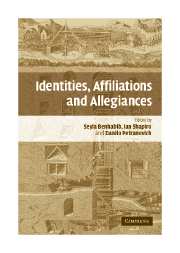Book contents
- Frontmatter
- Contents
- List of figures
- List of tables
- List of contributors
- Editors' introduction
- Part I Emergence and limits of national political identities
- Part II Multiple identities in practice: the European example
- Part III Decoupling citizenship from identity
- 8 Binding problems, boundary problems: the trouble with “democratic citizenship”
- 9 Immigrant political integration and ethnic civic communities in Amsterdam
- 10 Nonterritorial boundaries of citizenship
- 11 Against birthright privilege: redefining citizenship as property
- Part IV Identity and historical injustice
- References
- Index
11 - Against birthright privilege: redefining citizenship as property
Published online by Cambridge University Press: 05 June 2012
- Frontmatter
- Contents
- List of figures
- List of tables
- List of contributors
- Editors' introduction
- Part I Emergence and limits of national political identities
- Part II Multiple identities in practice: the European example
- Part III Decoupling citizenship from identity
- 8 Binding problems, boundary problems: the trouble with “democratic citizenship”
- 9 Immigrant political integration and ethnic civic communities in Amsterdam
- 10 Nonterritorial boundaries of citizenship
- 11 Against birthright privilege: redefining citizenship as property
- Part IV Identity and historical injustice
- References
- Index
Summary
While the topic of immigration attracts considerable attention, it is by means of birthright, and not naturalization, that approximately 97 percent of the global population acquires political membership. In distributing membership and entitlement, or what Michael Walzer calls “the most important good” within our communities, modern polities have long adhered to a formal, legal connection between entitlement to membership and circumstances of birth. This adherence automatically bequeaths to some a world replete with opportunity and condemns others to a life with little hope. There is no doubt that membership status in any given state or region – with its particular level of wealth, degree of stability, and human rights record – is, even in the current age of increasing globalization and privatization, a crucial factor in the determination of life chances. Political and legal theory has, however, had remarkably little to say about the system of distributive injustice attributable to current birthright citizenship laws.
This lacuna is especially surprising in light of recent and vibrant citizenship debates concerning topics closely related to the injustice in question – for example, the claims of minority groups, the narratives of collective-identity formation, and the ethics of political boundaries. These debates engage with what can be referred to as the “identity-bonding” dimension of citizenship. What remains conspicuously absent from these discussions, however, is any analysis of what we might call the “opportunity-enhancing” implications of the entrenched norm and legal practice associated with automatically allocating political membership according to kinship and heredity principles.
- Type
- Chapter
- Information
- Identities, Affiliations, and Allegiances , pp. 257 - 282Publisher: Cambridge University PressPrint publication year: 2007
- 9
- Cited by



